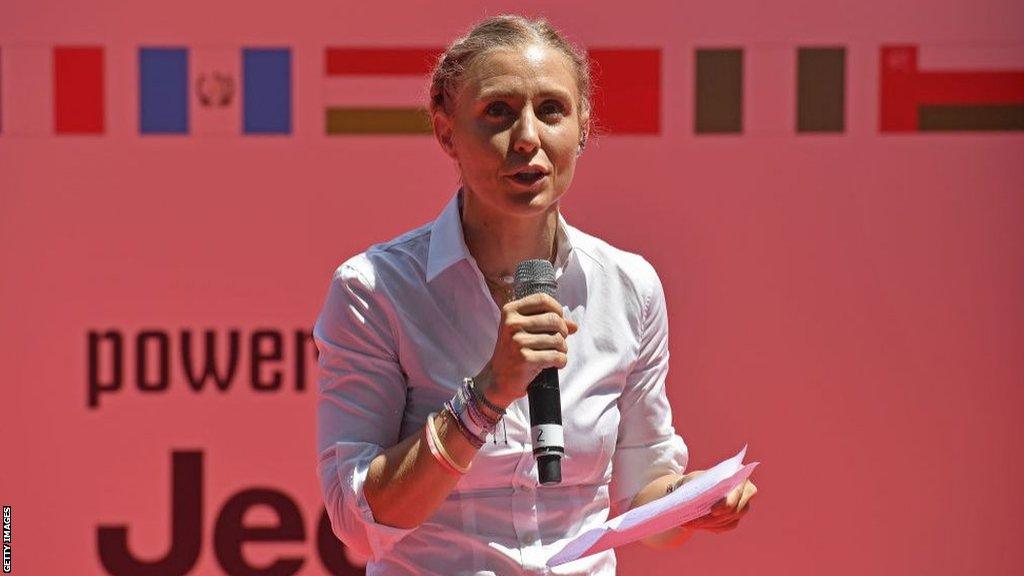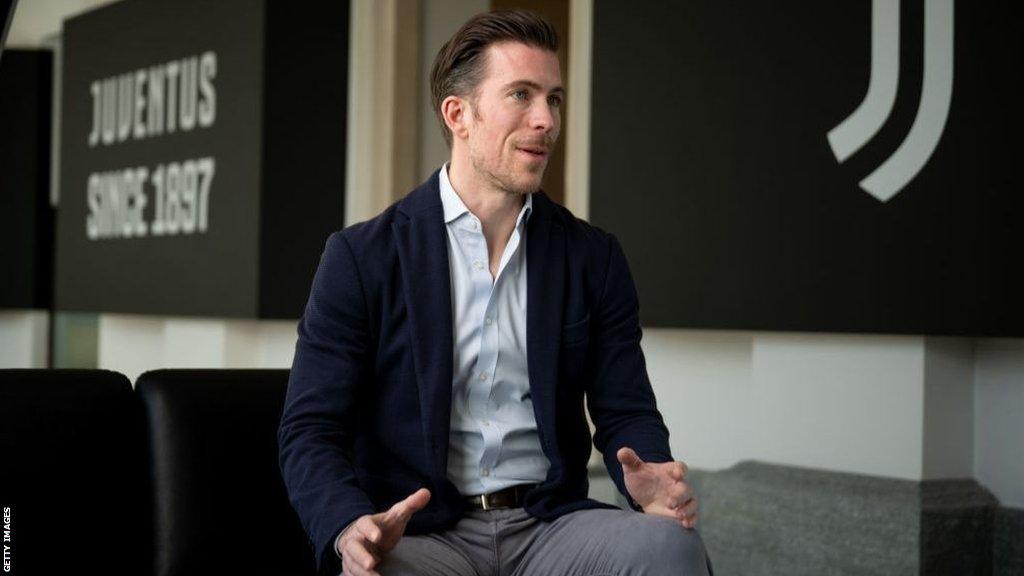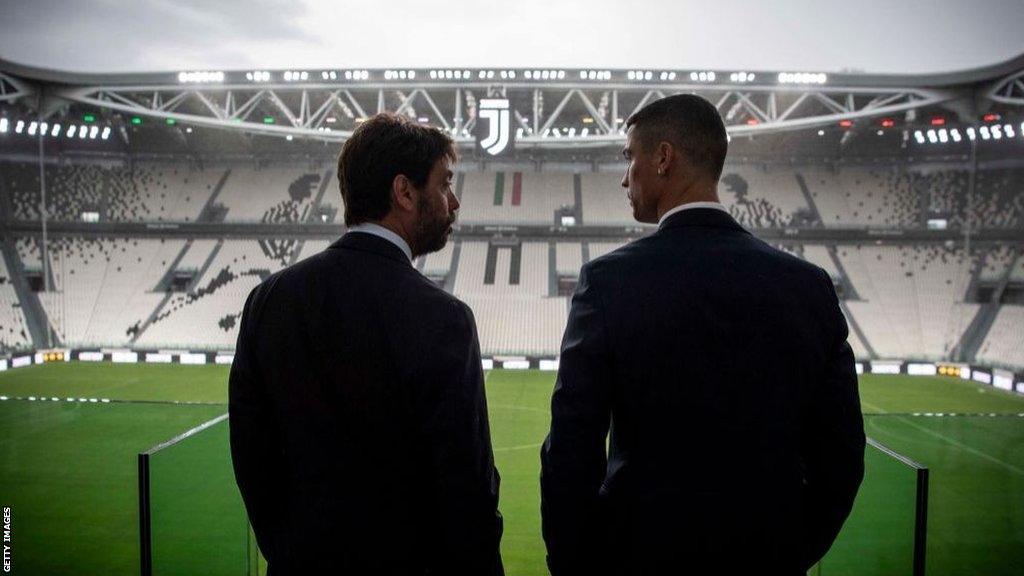Brain games, 'LA-style' creator labs & TikTok: Embracing innovation at Juventus
- Published

Carolina Chiappero worked in brand development at Juventus before becoming innovation manager, having previously worked for Nike
Carolina Chiappero is the award-winning innovation manager at Juventus, although, as she jokes, that role is perhaps an innovation in itself.
Juventus are the first club in Italy to adopt such a position and Chiappero is the person tasked with facilitating change at one of European football's most-decorated outfits.
The aim is to make the club more efficient on and off the pitch - gaining performance advantages, improving fan experiences and diversifying revenue streams - by identifying start-ups and creative businesses to form a network the club can collaborate with.
As Chiappero says, it is "matching one of your needs with a solution outside".
It is a potentially daunting remit, especially in a business where a large majority of high-profile roles are filled by men.
"Proposing change is always hard, regardless of gender," Chiappero tells BBC Sport. "I cannot hide that football is a male-dominated world but things can change and do change.
"I am a living innovation in a certain way if you think about it, but joking apart... I feel in a way this responsibility of being a leading example.
"I am not doing something particular but I think that at least letting people know that if you work hard or believe in something, no matter male or female, you can reach it. I really hope that the simple things I do can inspire other women."
A handful of top European clubs have adopted similar approaches and Juventus find themselves sharing knowledge with Arsenal, Barcelona and Real Madrid, as well as companies outside the sporting industry.
"We started from scratch," adds Chiappero. "From one side it was a big challenge, from the other side probably the best situation. We could shape innovation in the way we thought was best."
One such collaboration is with i-BrainTech, where players control on-screen avatars with their brain to help boost concentration levels or aid injury recovery. It was this partnership that saw Chiappero collect the Innovation of the Year award at the 2023 Social Football Summit.
But the role is varied. Another successful project saw Juventus canvas students for ideas, resulting in the club launching a Stories of Strength podcast where key figures share their own mental health experiences.
More broadly, one of Chiappero's objectives it to foster an innovation culture, "helping people, not dictating", and she believes that comes incrementally rather than by introducing anything radical. Generally, colleagues have been receptive.
"You need open-minded people, you need to leverage on some people who believe change is easier compared with others," adds Chiappero.
"But also a context that allows you to do so. Allowing someone to put together a project about something new is not something that happens everywhere. To be sincere is an innovative aspect of Juventus, for sure."
Chief marketing and communications officer Mike Armstrong says Chiappero has been building small business within the club for a while.
"You need people who are switched to open to be working in innovation," he adds. "You have to be able to look at a lot of opportunities and not be judgemental right from the start."

Mike Armstrong joined Juventus in 2021
Owned by the Agnellis for more than a century, Armstrong says that continuity gives Chiappero and his team an advantage when planning long term.
The Bianconeri also buy into the family's reputation as entrepreneurs and innovators. But, at a club whose history glitters with trophies yet is littered with crises, some evolutions are not always met with universal approval by fans, such as the proposed European Super League.
Armstrong says there is sometimes a struggle between the economics of European football and keeping supporters happy, which can lead to "natural tension".
"The business of football isn't an easy business right now, and so the economics are tough," he explains. "Because the economics are tough, teams need to innovate, they need to diversify and try new things, which sometimes fans don't like.
"It is difficult and it has to be sorted out so the fans can also be happy with the performance on the pitch and the players and why they come to the stadium every match."
'Dramatic growth' despite Ronaldo exit

Andrea Agnelli brought Cristiano Ronaldo to Juventus between 2018 and 2021
Juventus have found many younger fans are now deciding which clubs to follow not based on family affiliations or where their star players are, but rather those who produce the best content. Think Wrexham as an extreme example.
Local fans have the geographical pull and connection of going to the stadium, but Juventus calculate 90% of their fanbase is now outside of Italy and recently built what Armstrong describes as a "LA-style" creator lab to feed that wider audience, bringing together influencers, creators, editors and videographers.
They have become a leading TikTok account in the process and were the first club to deliver a mini-series on the platform, focusing on their 'Next Gen' side, having previously produced an All or Nothing series on the first team for Amazon.
"We have done a lot to differentiate ourselves and we are seeing the results," explains Armstrong. "In a time where we have seen Ronaldo exit Juventus, we have actually seen a dramatic growth in our video views."
Rather than other football clubs, Armstrong sees Juventus competing for engagement with the likes of WWE, the NBA or Disney.
"For me, that is why innovation is extra important because the competition is all industries within the media world now," he says.
"People don't wake up and programme their day, say 'OK, I'm going to watch BBC Sport at this moment and then read these articles here, and tune into Juventus there…' it is just everything is being thrown at them all at once and we all need to try and find a way to earn attention.
"Most teams rely on big, star players with hundreds of millions of followers and performance on the pitch to drive the digital business, what we're building is a model that is working without the necessity to rely on huge star players and, to some extent, performance on the pitch."